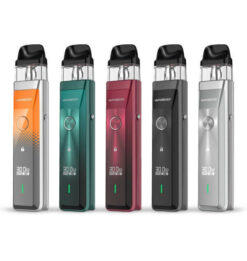After being postponed last year due to the coronavirus pandemic, the World Health Organisation’s (WHO) long-awaited Framework Convention on Tobacco Control (FCTC) COP9 is taking place this week.
The conference, which is being held online due to the travel restrictions that are still in place for some, will see the WHO meet with global leaders to discuss tobacco control policy. However, despite the key role vaping continues to play for many trying to quit smoking, according to the global health body there’ll be no discussion on e-cigarettes this time around.
In its ‘provisional agenda’ which was released in August, the WHO indicated that its report on emerging nicotine products, including vaping devices, was being postponed until the next convention in 2023.
It’s no secret the WHO aren’t yet sold on the science behind e-cigarettes (despite the ever-expanding body of evidence that shows vaping is far safer than smoking) with members of the organisation regularly questioning the safety of vaping. And after refusing to discuss e-cigarettes or grant public access to the conference, the move is seen as yet another example of the organisation’s dismissive attitude towards vaping.

Anger over WHO’s position
This latest snub has angered many pro-vaping and tobacco control groups, who believe the WHO’s stance is starting to look increasingly like an anti-vaping witch-hunt. Furthermore, despite the WHO’s insistence that e-cigarettes are off the agenda at COP9, some believe this is merely a smokescreen to avoid scrutiny with vaping likely to be a hot topic at the conference.
Nancy Loucas, Executive Coordinator for the Coalition of Asia Pacific Tobacco Harm Reduction Advocates (CAPHRA) says the discussions around vaping products will still be taking place – just behind closed doors: “It’s clear that was a complete pretence aimed at minimising a growing backlash against the WHO’s anti-vaping agenda.”
Documents obtained by CAPHRA from the WHO’s Western Pacific Regional Organisation’s meetings appear to prove Loucas is indeed correct, as they say the meeting is in preparation for the ‘Ninth Conference of the Parties’ and will include ‘scientific updates on emerging tobacco and tobacco-like products, and nicotine products’.
So if the WHO is discussing vaping after all, why are they being so cloak and dagger about it? Surely if they trusted the information they’ll be presenting then they’d be willing to make it public for others to dissect and potentially challenge.

Counter events in response
Despite the WHO’s best efforts to shut down the discourse on vaping, some have taken matters into their own hands in an effort to give vapers a voice.
One way they’ve done this is by setting up a global broadcast to run concurrently with the COP9 conference. Dubbed sCOPe, or ‘Streaming Consumers On Point Everywhere’, the online broadcast features tobacco harm reduction experts and consumer advocates for safer nicotine products. The five-day livestream is being aired on YouTube and Facebook, and throughout the broadcast speakers will look to challenge and scrutinise the WHO – as well as discussing who’s influencing and funding the organisation’s anti-vaping agenda.
Loucas, the organiser of the event, said setting up sCOPe was essential for giving vapers a platform on which to challenge the WHO’s stance and oppose this very deliberate shut-out.
“Before the COVID-19 pandemic, consumers were planning to front up to COP in person and show the media our increasing anger for being shut out, once again, from the proceedings. The FCTC’s decision to delay COP9 and host it exclusively online, with no discussions to be publicly released, meant consumers had to take alternative action. Hence, the development of sCOPe.
“sCOPe is our response to being excluded from the table, as the main stakeholders, of the discussion and decision-making process that directly impacts our health and our right to make informed decisions,” she added.
In Geneva, the home of the WHO and the location of the COP9 conference, the World Vapers’ Alliance (WVA) has taken a different approach.
Irked by the WHO’s continued ignorance around vaping, the group has resorted to driving a pink ‘Vape Bus’ through the city’s streets while the voices of vapers telling stories about how e-cigarettes have helped them quit smoking are blared out through the on-board PA system.

What’s behind the WHO’s anti-vaping stance?
Despite holding such influence over public health and policy, it seems the WHO is no closer to acknowledging the undeniable science around vaping. That much is clear, but what’s not so clear is why.
Financially backed by Michael Bloomberg, who donates millions of dollars to the organisation every year, much of the WHO’s policy related to tobacco reduction is heavily influenced by the American billionaire.
Bloomberg has been a consistently vocal critic of vaping products, and sadly it appears the world’s leading authority on public health is bending to the will of a guy on a one-man anti-vaping crusade, ignoring the mounds of studies that show e-cigarettes are a much safer alternative to smoking and demonising a tool that could potentially save hundreds of millions of lives.
If the WHO continues to pursue this misguided, ill-informed and ultimately dangerous campaign against vaping, global leaders will be encouraged to introduce stricter laws around e-cigarettes. If this happens, then for millions of smokers around the world a crucial lifeline will be removed, and inevitably more people will end up dying from smoking-related illnesses.
If you’d like some information on how vaping can affect your health, check out our Vaping Health Facts guide. Here you can find all the information you need relating to vaping and the effects using e-cigarettes has on your body.





